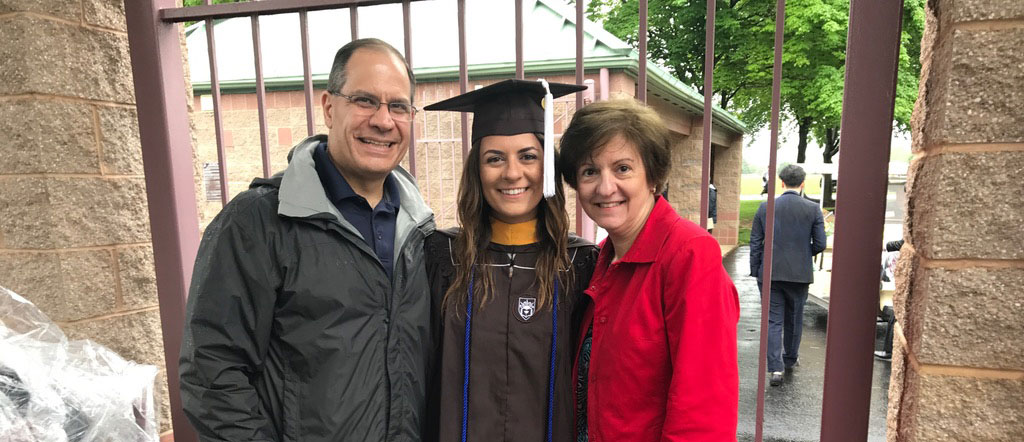Cleaning a toilet. Sitting in gridlocked traffic. Doing taxes. Just three of the things that one-third of people said they’d rather do than floss their teeth in a 2015 survey conducted by the American Academy of Periodontology.
That might explain why only 4 in 10 Americans wrap floss around their fingers daily to clean their teeth. People must know not flossing is a bad choice because the same survey indicates that 27 percent of people lie to their dentists about how often they actually do floss.
Like it or not, flossing is part of the standard of care in a good oral health routine. That’s why there is a national day dedicated to it: November 25. Yup, the day after Thanksgiving is when you should be thinking about the importance of floss, not Black Friday shopping nor college football.
Fat chance? Still plan on lying?
Dr. Fotinos Panagakos ’86 ’07G hopes you might reconsider.
Panagakos has had a storied career. He came to Lehigh as a first-generation student on an ROTC scholarship and majored in biology. He left with the love of his life, Judy, who asked him to the Alpha Gamma Delta formal. He could either enter active duty after dental school or join the reserves while in dental school. He chose reserves, teeth, and Judy – maybe not in that order.

In this image: Fotinos Panagakos ’86 ’07G stands with his wife, Judith Lannin Panagakos '86, and their daughter Alexandra '17 at her graduation
While earning both a DMD and PhD in Biochemistry, he also operated a part-time dental practice. Upon graduation, the university asked him to remain on as a faculty member. He accepted, but recognizing his medical program only taught him the clinical and research components, he entered a Master of Education program. He also served his country for 13 years as an officer in the New Jersey Army National Guard and Army Reserve.
Soon, Colgate sought him as a researcher, and eventually, he moved into a full-time role with them. Unfamiliar with the corporate business jargon, he returned to Lehigh for his Master of Business Administration. As he and Judy became empty-nesters, he jumped back into academics, serving as associate dean for research and then interim dean overseeing the West Virginia University School of Dentistry. Today, he is the founding dean for the School of Dental Medicine at Pacific Northwest University of Health Sciences in Yakima, Washington.
In the lab, Panagakos studied inflammation in cells and its impact on both oral health and total body wellness.
“There are clear correlations between gum disease and diabetes, early onset dementia, and heart disease,” he says. “When plaque removed from clogged arteries is examined, often there are embedded bacteria that only can come from the mouth.”
Think of it like this: There is an infection in your mouth. You can’t see it or feel it. You floss. You bleed at the gumline around certain teeth. That blood is from the floss working to clean out that infection. The bacteria and their byproducts in your mouth then have an opportunity to enter your bloodstream and spread that infection to other cells in your body.
Thus mouth bacteria found in cardiac plaque.
This is why dentists measure your gums during routine cleanings. The slow recession caused by brushing too hard and not flossing is often undetected. You only notice it when a tooth starts to hurt because the bacteria and their byproducts attack the soft tissue and bone supporting the root.
Flossing can help.
“It does two things: removes the gross debris from eating and helps remove plaque where a brush doesn’t reach,” he says.
Any water flossers out there? That tool removes the food bits and some of the plaque.
“The mechanical action of brushing and flossing are the most important,” he says. “Toothpaste is a vehicle for fluoride and mouth freshening agents. What matters is the bristles and waxy string brushing and rubbing along the surface of the tooth to remove the film.”
Removing plaque before it becomes tartar has to happen daily.
So the standard of care remains brushing twice and flossing once.
That is especially true after Thanksgiving.
“It is probably the biggest eating day in the country,” he says.
If you are grazing all day and eating mounds of simple carbohydrates, it is a party in your mouth … for the bacteria that create oral health problems.
Those carbs are high in sugars, the favorite food source for those bacteria.
“We often over indulge because Thanksgiving is the day where we might eat two slices of pecan pie,” he says.
So, after your meal and before you loosen your belt, turn on the game, and fall asleep with the newspaper circulars lying around you, grab some floss, clean your teeth, and tell your dentist the truth about it.